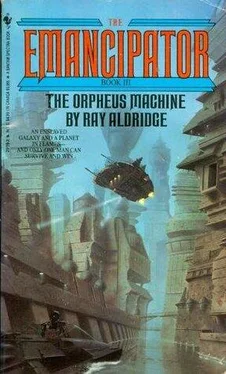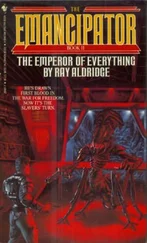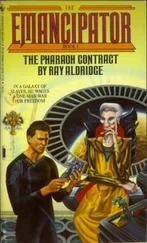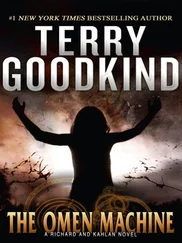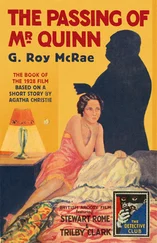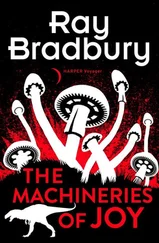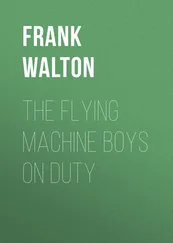“Let’s go,” he said, and stepped through the ghost of the Machine, which broke around him into a tatter of pale streaming color.
The Gench led him through an arch at the cavern’s far end, and then up a narrow staircase. Ruiz saw that his oxygen reserve was down to nine minutes; he shook his head and reluctantly opened his vents. He suffered an instant of vertigo, but no new horrors assailed him through the hallucinatory shimmer.
He didn’t look back at the spot where the Machine had been.
At the top of the stairs, the Gench indicated a row of dark alcoves spaced along a narrow gallery. “Look carefully,” it whispered.
Ruiz entered the nearest, moving cautiously. At the end of a short tunnel, a meter-wide opening glowed. He crept up to it and peeked through.
Below him a maze filled a vast cavern. The light was hotter and brighter — more orange, more energetic than the light of the tunnels. The thick meltstone walls, each a little higher than a tall man, rippled outward from a low central building. Corridors twisted and turned in confusing patterns, but from above, Ruiz could see that three paths led inward, from three separate arches in the perimeter of the cavern. Lying atop the walls at two of the entrances were armored men. Both men held weapons ready, all their attention concentrated on the arches. To Ruiz’s drugged eyes, they seemed like icons of ambush, dire and monstrous. He wanted to laugh at their unknowing vulnerability.
Beside him the Gench whispered, “The slaver’s mighty bug waits in a niche just inside the third way.”
Ruiz considered. “Will we be interrupted by hordes of bloodthirsty Gencha? Or servitors?”
“No,” answered the Gench. “We are not a physical race, and the servitors have all fled to the farthest holes of the enclave. They cannot understand this conflict among their gods.”
“I see,” said Ruiz. He forgot where he was and took a deep breath, attempting to calm himself, but the act charged his brain with distorted visions, and the armored men seemed to multiply, so that the maze was suddenly crowded with enemies.
Ruiz turned away and switched his oxygen back on. He fumbled with his weapons rack, then gathered the elements of a heavy pinbeam — identical to the one Junior had chosen to carry as a primary weapon. An assassin’s tool, Ruiz thought, inexplicably contemptuous.
His mind cleared a little as he assembled the thing.
In the pinbeam’s multiplier scope, the first soldier’s image swelled until Ruiz could set the cross hairs on his neck bellows — the weakest area of the Deltan’s armor. At first the man’s hunched shoulder blocked the most vulnerable surface of the armor. Ruiz waited until the man shifted slightly, and then he drilled the beam through armor and vertebrae. The man slumped silently.
Ruiz shifted his aim to the other soldier and killed him with even less effort. He felt strongly the new sickness that filled him each time he committed an act of violence, the sickness that had taken root in his heart during his stay on Roderigo. He pulled the pinbeam from the opening, gasping. Slowly it penetrated his consciousness that an alarm was buzzing. He looked at the oxygen gauge. Empty. He opened his vents and let the mindfire back into his brain.
“It knows. She knows,” said the Gench.
Corean stood before the beautiful corrupt face of her Machine, listening to the wonderful things it was saying to her, breathing in the mindfire that filled the Machine’s temple, glorying in her power. She had run out of oxygen some time before, but so far she felt no severe skewing of her perceptions.
The servitor Soosen had long since run away terrified, and Corean had seen no one since.
The Machine spoke in its own sonorous voice: “You will clone an army of Ruiz Aws and go forth to rule the worlds. Who could stand before you? Who?” It opened its mouth wide and the little skulls that lined its jaws sang a pure soprano refrain: “Who…?”
But then the mouth snapped shut and all its eyes flared with hallucinatory terror. The eyes flickered from side to side, and the Machine began to turn away from her on its hundreds of feet.
“What is it?” She felt a panic as fierce as her exultation had been a moment before.
“He’s here somewhere. Close,” said the Machine, lumbering toward its innermost shrine, a hollow lump of monomol in the center of its temple. “Your enemy. He seeks my blood and yours.”
“Where? Don’t you know?” Corean backed away from the arch that led into the temple, expecting to see Ruiz Aw, triumphant.
“No. But he’s killed your two soldiers.” The Machine scuttled into its shrine and crouched down. The shrine resembled a huge squat hat, and to Corean’s drugged perceptions, the Machine now became the head of some gigantic monster, temporarily buried neck deep in the alloy floor of the temple. Its thousands of eyes glittered out at her from the darkness inside the shrine. She willed it to rise up and defend her.
“Protect me!” she demanded.
“I cannot,” said the Machine. “My volition is a feeble thing. My great weakness is that I must obey the being who is physically closest to me. Is this not absurd? If you lose me to Ruiz Aw, he will be my master. Set your bug on him — quickly, before he can reach me.”
She ran toward the shrine, shouting for her Moc. She stood for a moment outside the shrine, hesitating. Some remaining human part of her wanted very badly not to go inside. But that part of her died quite suddenly, and she went to crouch in the decaying embrace of her Machine. The Machine cycled the protective blast doors shut.
She looked down through the grating under the Machine, into the small sump that fed the Gencha elements of the Machine. Cilia dropped into the slime, roiling the bones and undissolved gobbets of flesh; somehow it seemed inappropriate that the Machine should be feeding, even as Ruiz Aw pursued her. “Stop that,” she snarled, and the Machine retracted its cilia. It chuckled, oddly enough.
Then her Moc was outside, moving around the shrine in a flickering evasive pattern.
“Ruiz Aw is here,” she shouted. “Kill him.”
And the Moc was gone.
“What’s going on?” asked Ruiz. “Where’s the Moc?”
The Gench shuddered, heaved its bulk forward, tentacles questing. Ruiz drew back from the glistening filaments; they made him terribly nervous, even though he believed in the Gench’s sincerity.
“I cannot say for sure. The opposing faction sends confusing messages over the pheromonic net.”
“Wonderful,” said Ruiz sourly. “My life — not to say the future of the human race — hangs on the outcome of a Gencha farting contest. Why am I not more astonished?” He felt a wild laugh bubble up into his lungs; frightened, he choked it off.
“There.” The Gench gestured and Ruiz looked.
The Moc flickered along the edge of the maze, its natural speed exaggerated by Ruiz’s distorted vision. He hoped it couldn’t see him in the darkness of the alcove above the maze, because in his present state he was absolutely certain to die in any direct confrontation with the uncanny thing. He jerked his head down and spoke to Nisa’s clone. “What did you see?”
“Corean’s giant bug, running along the edge of the maze. Why didn’t you kill it?”
Ruiz groaned and felt a paralyzing fear — it seemed to suck all the strength from his legs. His imagination ran wild; he saw the Moc killing him in a dozen painful ways. He squeezed his eyes shut — which, he realized sluggishly, was a mistake. In the absence of competing vision, the hallucinations became a great deal more vivid.
He opened his eyes wide. “Is there another way in? To this old place?”
Читать дальше
